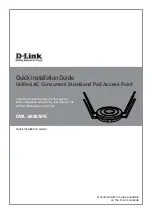
14
Cisco Catalyst 9117AX Series Access Points
10
Powering the Access Point
The AP can be powered only through Power-over-Ethernet (PoE) using the following:
802.3at Cisco Power Injector AIR-PWRINJ6=
Note
If USB is used with 802.3at power, the AP will work with reduced features.
802.3af Cisco Power Injector AIR-PWRINJ5=
Note
If AIR-PWRINJ5= is used, the AP will work with reduced features.
Any 802.3at (25.5 W) compliant switch port
11
Configuring and Deploying the Access Point
This section describes how to connect the access point to a wireless controller. Because the configuration process takes
place on the controller, see the
Cisco Wireless Controller Configuration Guide
for additional information.
The information in this section does not include configuring Link Aggregation. For information on configuring Link
Aggregation, see the Cisco Wireless Controller Configuration Guide, Release 8.2, at the following URL:
http://www.cisco.com/c/en/us/td/docs/wireless/controller/8-2/configuration-guide/b_cg82.html
The Controller Discovery Process
The access point uses standard Control and Provisioning of Wireless Access Points Protocol (CAPWAP) to communicate
between the controller and other wireless access points on the network. CAPWAP is a standard, inter-operable protocol
which enables an access controller to manage a collection of wireless termination points. The discovery process using
CAPWAP is identical to the Lightweight Access Point Protocol (LWAPP) used with previous Cisco Catalyst access points.
LWAPP-enabled access points are compatible with CAPWAP, and conversion to a CAPWAP controller is seamless.
Deployments can combine CAPWAP and LWAPP software on the controllers.
The functionality provided by the controller does not change except for customers who have Layer 2 deployments, which
CAPWAP does not support.















































